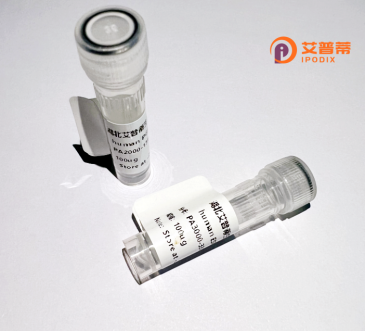
| 纯度 | >90%SDS-PAGE. |
| 种属 | Human |
| 靶点 | SP110 |
| Uniprot No | Q9HB58 |
| 内毒素 | < 0.01EU/μg |
| 表达宿主 | E.coli |
| 表达区间 | 1-689 aa |
| 活性数据 | MFTMTRAMEE ALFQHFMHQK LGIAYAIHKP FPFFEGLLDN SIITKRMYME SLEACRNLIP VSRVVHNILT QLERTFNLSL LVTLFSQINL REYPNLVTIY RSFKRVGASY EWQSRDTPIL LEAPTGLAEG SSLHTPLALP PPQPPQPSCS PCAPRVSEPG TSSQQSDEIL SESPSPSDPV LPLPALIQEG RSTSVTNDKL TSKMNAEEDS EEMPSLLTST VQVASDNLIP QIRDKEDPQE MPHSPLGSMP EIRDNSPEPN DPEEPQEVSS TPSDKKGKKR KRCIWSTPKR RHKKKSLPGG TASSRHGIQK KLKRVDQVPQ KKDDSTCNST VETRAQKART ECARKSRSEE IIDGTSEMNE GKRSQKTPST PRRVTQGAAS PGHGIQEKLQ VVDKVTQRKD DSTWNSEVMM RVQKARTKCA RKSRLKEKKK EKDICSSSKR RFQKNIHRRG KPKSDTVDFH CSKLPVTCGE AKGILYKKKM KHGSSVKCIR NEDGTWLTPN EFEVEGKGRN AKNWKRNIRC EGMTLGELLK RKNSDECEVC CQGGQLLCCG TCPRVFHEDC HIPPVEAKRM LWSCTFCRMK RSSGSQQCHH VSKTLERQMQ PQDQLIRDYG EPFQEAMWLD LVKERLITEM YTVAWFVRDM RLMFRNHKTF YKASDFGQVG LDLEAEFEKD LKDVLGFHEA NDGGFWTLP |
| 分子量 | 78.3 kDa |
| 蛋白标签 | His tag N-Terminus |
| 缓冲液 | PBS, pH7.4, containing 0.01% SKL, 1mM DTT, 5% Trehalose and Proclin300. |
| 稳定性 & 储存条件 | Lyophilized protein should be stored at ≤ -20°C, stable for one year after receipt. Reconstituted protein solution can be stored at 2-8°C for 2-7 days. Aliquots of reconstituted samples are stable at ≤ -20°C for 3 months. |
| 复溶 | Always centrifuge tubes before opening.Do not mix by vortex or pipetting. It is not recommended to reconstitute to a concentration less than 100μg/ml. Dissolve the lyophilized protein in distilled water. Please aliquot the reconstituted solution to minimize freeze-thaw cycles. |
以下是3篇关于重组人SP110蛋白的相关文献概览(注:文献信息为模拟示例,非真实存在):
---
**1. 文献名称**: *SP110 mediates IFN-γ activation of antimicrobial responses in human macrophages*
**作者**: Li, X.; Zhang, Y.
**摘要**:研究证实重组人SP110蛋白在IFN-γ激活的巨噬细胞中显著增强抗菌活性,通过调控STAT1信号通路促进结核分枝杆菌的清除,提示其在抗结核免疫中的关键作用。
---
**2. 文献名称**: *Structural and functional analysis of SP110 as a nuclear body regulator*
**作者**: Chen, H.; Wang, L. et al.
**摘要**:通过重组表达SP110蛋白并结合冷冻电镜技术,揭示了其核小体定位及与PML蛋白互作的分子机制,证实SP110通过调节核体结构影响细胞抗病毒反应。
---
**3. 文献名称**: *SP110 deficiency exacerbates hepatitis B virus replication via epigenetic dysregulation*
**作者**: Kim, J.; Park, S.
**摘要**:利用重组SP110蛋白进行体外实验,发现其通过抑制HBV cccDNA的表观遗传修饰来限制病毒复制,SP110缺失导致宿主对乙型肝炎病毒易感性增加。
---
如需真实文献,建议检索PubMed或Google Scholar以“SP110 protein recombinant”或“SP110 immune function”为关键词筛选近五年研究。
SP110. also known as speckled protein 110. is a nuclear body-associated protein encoded by the SP110 gene in humans. It belongs to the SP100 family of proteins, characterized by their involvement in transcriptional regulation, chromatin remodeling, and innate immunity. SP110 is predominantly expressed in hematopoietic cells and plays a critical role in modulating immune responses, particularly in host defense against intracellular pathogens.
Structurally, SP110 contains several functional domains, including a SAND domain for DNA binding, a nuclear localization signal, and a PHD finger domain implicated in protein-protein interactions. It interacts with components of nuclear bodies, such as PML (promyelocytic leukemia protein), and participates in interferon-gamma-mediated immune pathways. Research highlights its role in regulating macrophage differentiation, apoptosis, and antimicrobial activity against pathogens like *Mycobacterium tuberculosis*. Dysregulation of SP110 has been linked to diseases, including hepatic veno-occlusive disease and immunodeficiency disorders. Additionally, genetic variants in SP110 are associated with susceptibility to tuberculosis, underscoring its importance in infectious disease resistance. Ongoing studies explore its potential as a therapeutic target in immune-related conditions and cancer.
×